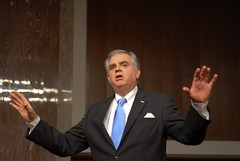
Bike Summit continue to reverberate.
(Photo © J. Maus)
My, what a difference a few years makes.
It was less than three years ago when then US Secretary of Transportation Mary Peters proclaimed that “bike paths” were not a part of transportation infrastructure. Fast forward to early this month when the current DOT chief Ray LaHood issued a strong statement calling for the “end of favoring motorized transportation at the expense of non-motorized.”
With that kind of leadership at the DOT, now the national conversation can finally get real. Case in point is a wide-ranging discussion hosted (live and online) by the weekly political magazine National Journal. The issue was proposed and moderated by National Journal reporter Lisa Caruso.
Caruso asked, “Should bikes and cars be treated equally?” and framed it as both a philosophical and practical (in terms of funding) issue:
“LaHood called the new policy a “sea change,” but is it a good one? Should non-motorized modes of transportation be treated as equal to other modes, particularly when modes like driving and mass transit are at least partially, if not primarily, self-funded? Or is it the essence of DOT’s evolving 21st-century mission to give people more mobility options that, according to LaHood, are relatively fast and inexpensive to build, are environmentally sustainable, reduce travel costs, improve safety and public health, and “reconnect citizens with their communities”?”
Four experts on transportation policy contributed answers on the National Journal blog: Greg Cohen, President and CEO, American Highway Users Alliance; Keith Laughlin, President, Rails-to-Trails Conservancy; Rob Atkinson, President, Information Technology and Innovation Foundation; and Petra Todorovich, Director, America 2050.
All of them but Mr. Cohen from the highway users group were supportive of Sec. LaHood’s statement — but even Cohen did not denounce it outright. He gave a thoughtful and illuminating response.
Cohen disagrees with LaHood’s call for bike-car equality. He points to national polls showing that 72% of Americans feel the federal government should take a “leadership role” in funding major highways and bridges and that only 4% says a similar role should be taken on funding “bicycle paths”. because he feels there’s already not enough money to fund highways and bridges.
In addition, Cohen gets into the funding issue, saying that 14 out of 15 Americans want the gas tax and other “highway user fees” to be spent only “exclusively on roads and bridges.” “I think this indicates that Secretary LaHood’s recent pronouncement is taking federal transportation policy in the wrong direction.”
Even though he disagrees with LaHood, Cohen seems resolved to the fact that bicycles are hear to stay, saying that, “there is and will continue to be a role for bicycle paths in federal transportation policy”. Cohen also calls on “bicycling and motoring communities” to seek common ground.
To do so, Cohen suggests a “federal user fee” program which would take the form of an excise tax on bikes and bike products to “support their programs”. Cohen estimates a 12% excise tax on new bike sales would raise $367.2 million per year.
Cohen also recommends that bicycle advocates “shake off the most radical elements” in their ranks “that demonize the automobile and truck.”
Read Cohen’s full response at NationalJournal.com.
Accompanying this discussion on the National Journal blog is video of a live panel discussion hosted by the Bipartisan Policy Center and moderated by Caruso. It includes Rep. Earl Blumenauer, Sen. Thomas Carper and others. I’ve embedded the video below.

